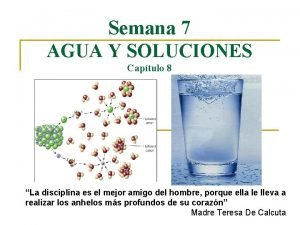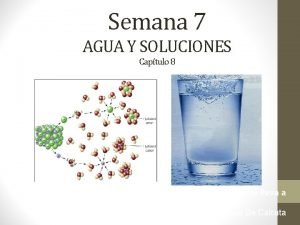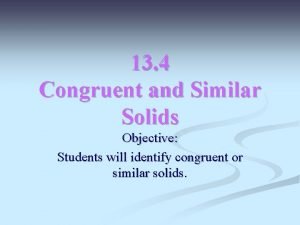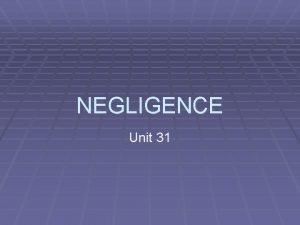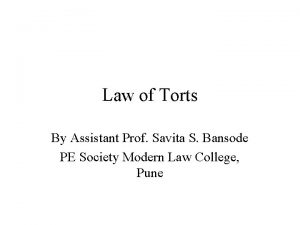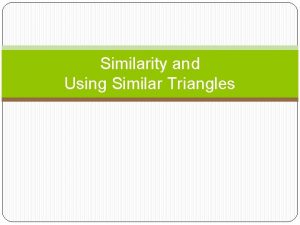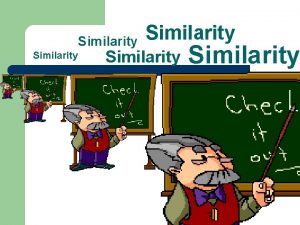WEEK TWO Tort and Similar Legal Concepts Tort










- Slides: 10

WEEK TWO

• Tort and Similar Legal Concepts • Tort and Crime • Tort and Criminal Law • Tort and Trust • Tort and Crime • Generally the purpose of criminal law is to protect the public at large and punish those found guilty. Crime and tort overlap, many torts are also crimes, sometimes with the same names and similar elements e. g. assault, battery and defamation.

• Criminal proceedings are brought by the State, although private prosecution is still possible and the object of the proceedings in all cases is the imposition of some sanction e. g. imprisonment or fine. Theses sanctions are usually reformative and not punitive. In Torts law, like crime has the purpose of deterrence and in very limited cases imposes overt punishment upon defendants in the form of exemplary damages. • Crime is a public offence while tort is a civil or private wrong. • The sanction for crime could be fine, incarceration or death while tort is monetary compensation or judicial remedies.

• Tort and Contract • The first point that must be made from a practical lawyers point of view is that there may be a considerable overlap in any factual situation between law and contract and law and Tort. It is unlikely that any legal system can ever separate these two conceptual classifications as they are found everywhere, but the student will recognise that the boundary must sometimes be crossed in the solution of a problem. • according to Winfields definition of Tort, tortious duties exist by virtue of the law itself and not dependent upon the agreement or consent of the persons subjected to them. • Contractual liability cannot exist independently of the parties, there must be an agreement or consent. In the case of Tort, there are however some instances where there is a tortious liability in situations where some prior

• Consent, undertaking or assumption of responsibility on the part of the defendant is essential. • Another difference is that in Tort, the content of duties are fixed by the law but in contractual duties it is fixed by the contract itself e. g. If I consent to your entry upon my premises then the duty which I owe you is the duty fixed by Occupiers Liability. • In some cases the content of the duty in contractual relations is fixed by the law e. g. Terms Implied under The Sale of Goods Law and The Hire Purchase Law. • The aim of law of Contract is enforcing promises, while the principal aim of tort is prevention or compensation for harm.

• Damaged in the view of contract puts the claimant in the position he would have been entitled to (subject to the law of remoteness) as a result of the transaction between the parties. Tort does not do this, the claimant only receives to the extent he or she had lost. • Concurrence of Contract and Tort • Contractual and tortious duties may co-exist on the same facts. A victim of fraudulent misrepresentation in contract may sue for a tort of deceit. There also some concepts that are common to contract and tort e. g. remoteness of damage.

• A wrongful act can be both a tort and a breach of contract e. g. A doctor negligently who forgets a pair of surgical blades in the stomach of a patient, will be liable to the patient for breach of an implied term of his contract to take reasonable care and for the tort of negligence. • Tort and Breach of Trust • A trust arises where property is given to trustees to hold on behalf of certain beneficiaries. A breach of trust arises where the trustee deals with the property in an authorised way. In an action for a breach of trust, the beneficiary may bring an action to recover the property or its value i. e. an action for liquidated damage, whereas a claim for damages is tort is unliquidated. Damages is a purely common law concept while trusrt is an equitable creation.

• Interests Protected by the Law of Torts • Personal Interest: This is the protection of a person from deliberately inflicted physical harm, restrictions on movement and the protection on interests in tangible property. • Interest in economic relations, business and trading interests: these include the tort of deceit, passing off, interference with contractual relations, conspiracy and intimidation. • Reputation: libel and slander. • Interference with judicial process: tort of malicious prosecution. • Interference with family relations.

• The Mental Element in Torts • Intention and Negligence: It must be proved that the defendants invasion of the right was either intentional or negligent. • Strict liability: Liability for dangerous animals and the rule in Rylands and Fletcher. • Motive and Malice: Motive deals with the reason behind a person doing a particular act. In the law of tort, motive is irrelevant. Is the defendants act is unlawful, the fact that he had a good motive will not exonerate him. Malice on the other hand means intentional conduct.

AIMS OF THE LAW OF TORTS • Generally we can say that Tort is concerned with the allocation and prevention of losses which are bound to occur in our society. in every society, numerous conflicts of interests arise and actions of one person or group of persons will from time to time cause or threaten damage to others. • This damage could be in any form such as injury to person, damage to physical property, damage to financial interests, injury to reputation etc. • The person who has suffered a damage would seek redress in law. this redress may take various forms, such as monetary compensation for injuries etc.
 Week by week plans for documenting children's development
Week by week plans for documenting children's development Similar disuelve a similar
Similar disuelve a similar Similar disuelve a similar
Similar disuelve a similar Lo similar disuelve lo similar
Lo similar disuelve lo similar Precipitancy creates prodigality
Precipitancy creates prodigality 12-5 areas and volumes of similar solids
12-5 areas and volumes of similar solids Chris and jenny are comparing two similar punch recipes
Chris and jenny are comparing two similar punch recipes Congruent and similar solids
Congruent and similar solids Tort and contract difference
Tort and contract difference Chesmore vs richards
Chesmore vs richards What is functionalism sociology
What is functionalism sociology

